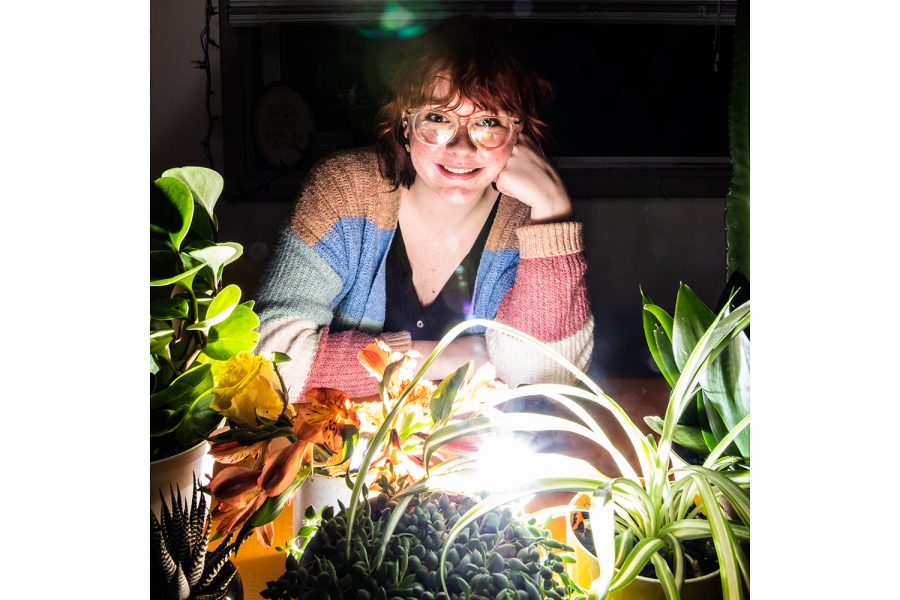Growing happiness: becoming a plant parent provides a connection to nature and benefits mental health
For a community of students and faculty in Iowa City, becoming a plant parent does more than just brighten up a room, it provides them with abundant health benefits.
Kali Schelby poses for a portrait in her apartment on Sunday, February 16, 2020. Schelby has multiple plants in her home, including a 4-foot tall cactus, succulents, and flowers.
February 19, 2020
With diverse greenery spilling over the white windowsill, the air smells fresh and natural upon entering Kali Schelby’s cozy Iowa City apartment. The self-proclaimed “plant mom” said she loves the livelihood plants bring into the space, especially in the cold wintertime. Her plants not only beautify her space, they provide her multiple health benefits in the winter months, including stress-relief, relaxation, and improving her concentration.
Consisting of a 4-foot tall cactus, a small barrel cactus with multiple other thriving succulents, a small spider plant with long, green leaves outlined in white, and a technicolor variety of flowers, Schelby’s collection of flora can be found dotting every available space of her apartment. The windowsills, dining table, countertops, and the top of her fridge all sport their own potted plant.
“It’s the dead of winter, everything’s dead, I’m dead inside, but my plants are alive so they’re really encouraging,” she said.
A community of students echo Schelby’s feeling toward being around her plants. With the risk of developing Seasonal Affective Disorder largely falling on young adults, according to the National Institute of Mental Health, college students make up a large portion of the community seeking ways to boost their mental wellness.
Ray Tallent, 10-year manager of the UI Biology Department’s Greenhouse and instructional assistant, said he sees a significant increase of students who choose to study in the greenhouse during the winter months.
“When students find out [about the greenhouse], they’ll come up and enjoy a few minutes or an hour in the greenhouse area. We wish we had more seating,” he said with a laugh. “I certainly see students at all times of the year, but most especially in these shorter days.”
According to the Journal of Environmental Psychology, a 2009 study about the benefits of indoor plants said engaging with nature, whether indoors or out, can increase positivity and heighten concentration. These benefits were recorded through surveys and experiments in relation to interactions with nature, including taking walks, gardening, and talking to plants.
Rebecca Don, a senior behavioral-health consultant with UI Student Wellness, bought her first plant five years ago, when she noticed other people had plants in their office. She realized growing indoor plants was something that she could easily pursue as well.
Now, her office in the Westlawn Building flourishes with potted plants. A Zanzibar Gem sits on her file cabinet in the back corner and a row of succulents line her windowsill. Flowering plants decorate her home when she returns from work.
Tallent said another reason for humans’ natural affinity to plants in general could be because of a theory called the biophilia hypothesis, an idea formulated by Edward O. Wilson in his 1984 book Biophilia. In the book, Wilson hypothesizes that humans feel a strong urge to reconnect with nature in a society that has become dominated by technology.
Don said being able to care for something other than herself has given her a sense of purpose.
“There’s a lot of research in all different disciplines and subjects that essentially amount to saying, ‘When people have purpose, they feel happier.’ They feel like they have value,” she said. “I think plants are a way to do that on a small scale. Definitely not the same scale as having children or a career that is very purpose-mission focused, but it’s a cool thing that makes you feel like, ‘Oh, I made that.’ ”
Don said low-maintenance plants such as succulents appealed to her because of how simple they are to care for.
“They can get folks like me to be like, ‘Oh, I can do plants!’” she said.
A 2015 study published in The Journal of Physiological Anthropology supports her claim, suggesting that in young adults, caring for plants “can reduce physiological and psychological stress compared with mental work.”
Suke Cody, a four-year employee of Moss, a plant store located on 112 E. Washington St., also said owning and caring for plants can have a positive effect on reducing stress.
Cody said that, for her, going in to work at Moss every day is extremely relaxing and has a positive effect on her overall mood.
Just on the other side of the block from Moss sits Get Fresh Café, a coffee and smoothie house brimming with plant life. Wendy Zimmermann, owner and administrator of the café, stated that she felt the need to open her location in her hometown of Iowa City.
“I was really attracted to this place because it has so many windows and such bright light that I knew as soon as I found this place I wanted to fill it with plants,” she said.
Tallent suggested that, in addition to being around plantlife associated with summertime, students may also be drawn to the greenhouse because of its use of auxiliary lighting in the winter. Known as “grow lights,” Tallent said the fixtures may act as a form of light therapy for students, which is one of the most effective and recommended treatments for SAD, according to the National Institute for Mental Health.
“Some students will park themselves basically under the lights for a while, because SAD may very well be photoperiod,” he said.
With large plants lining the top of the cooler and orchids on the serving counter of her café, Zimmermann said she thinks plants are a good reminder to connect with nature and caring for plants is a good way to relax. She has plans to add more plants to the café in order to reflect the overall organic composition of her business model.
“We’re very plant-forward with what we do. Lots of fruits, lots of vegetables, and the plants help to reflect that,” she said.
Below are some plants that are easy to take care of for fledgling plant parents: these plants are recommended by Moss’ Cody due to their low-maintenance personalities and forgiving nature.
Pothos plant
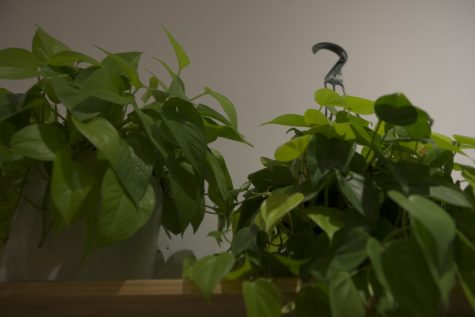
A pothos plant is seen inside Moss on Monday, Feb. 17, 2020.
Due to their easy and undemanding caring needs. Cody said pothos plants are the easiest of all houseplants to grow because they can thrive in any lighting as long as they have an adequate amount of water. These plants have pointed leaves, typically with white or yellow spots. Pothos generally thrive in indirect yet bright lights, and they still have the ability to grow to their full potential in darker areas, such as offices and dorm rooms, making these plants perfect for new plant owners, according to The Spruce
Sansevieria
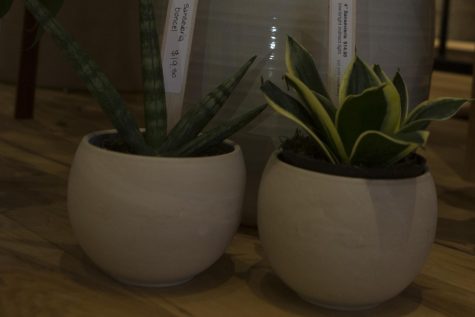
A sansevieria plant is seen inside Moss on Monday, Feb. 17, 2020.
Also known as the snake plant, this is recommended by Cody for beginning plant parents. These plants are tough and resilient, meaning they can survive in harsh environments. These hard-headed plants can survive in nearly any environment. Sansevieria plants do not require large amounts of water, because they only need to be watered every two to six weeks, according to Joyus Garden. They are also highly versatile when it comes to light, circulation, and temperature. Although there are many factors that come into play in plant life, sansevierias can handle mistakes and difficult environments. Almost nothing will stop these plants from thriving.
Philodendron
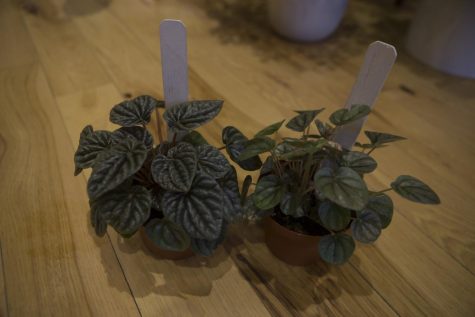
A philodendron plant is seen inside Moss on Monday, Feb. 17, 2020.
Philodendron are good at adapting to any environment, whether they be indoors or out.There are two types of philodendron plants — vining and non-climbing. Non-climbing philodendrons should have plenty of room on each side of them, as they grow out more than they grow up, unlike the vining type, which needs a supporting structure, according to Gardening Know How.
Peperomia
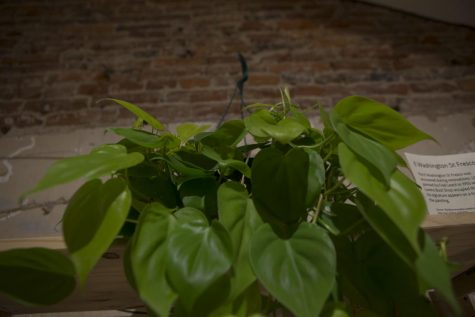
A peperomia plant is seen inside Moss on Monday, Feb. 17, 2020.
These are most commonly known as rubber plants. Peperomia plants have over 1,000 known species recorded. They can also tolerate nearly any type of light, but thrive best in moderate light to partial shade. Peperomia are tropical flowering houseplants. These plants are highly forgiving when it comes to improper care, or forgetful owners, making them great for beginners who are just learning to be responsible for plant life. Unfortunately for these plants, they’re picky on the type and amount of light that they receive. If they are given insufficient light, their leaves may drop, or they will quit growing new leaves. These plants are native to Mexico, South America, and the West Indies, according to The Spruce.
These plants are just a few among many that can teach better responsibility skills and lower stress levels, as well as adding a bit of foliage and nature to any space one desires.
Josie Fischels contributed to this article.



